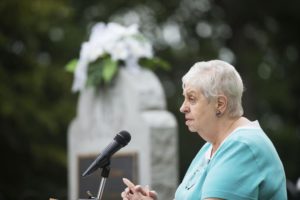On the 25th anniversary of the Srebrenica genocide, as well as commemorating the dead, we must take action to confront the growing trend of Bosnian genocide denial around the world.
This article is also available in: Shqip Macedonian Bos/Hrv/Srp
July 2020 signals the onset of two closely related anniversaries: a quarter century since the Srebrenica genocide, and a quarter of a century since the signing of the Dayton Peace Accords that ended the war in Bosnia and Herzegovina.
Much has and much more will be written on each of these events, and their significance for Bosnia’s post-war development, as well as their respective positions in the broader history of the post-Cold War period.
The Srebrenica Memorial Centre and the UK-based Remembering Srebrenicaorganisation, for instance, are doing invaluable work to memorialise and educate younger generations about the Bosnian genocide, the worst atrocity on the European continent since the end of World War II. And texts like George Packer’s recent biography of Richard Holbrooke are also helping to (re)interpret the significance – and errors – of the international community’s engagement in Bosnia in the 1990s.
But increasingly it seems that these are exceptions rather than the norm when it comes to writing and thinking about the Bosnian war. Instead, events over the last two years or so have painfully crystallised that Bosnia’s horror has become more myth than history. Amid this cacophony of disinformation, the voices of reactionaries and revisionists have begun to silence the experiences of survivors and the insights of scholars.
One cannot possibly provide a comprehensive survey of this phenomenon within this format, especially given that platforms like Twitter have become a veritable cesspool of revisionism concerning the wider dissolution of Yugoslavia.
But a handful of recent highlights nevertheless stand out.
The Christchurch terrorist attacks in March 2019 saw the killer prominently deploying Serbian ultra-nationalist motifs during the massacre. Since then, we have learned that the European far-right has begun to aggressively deepen its ties to Serb ultra-nationalist and reactionary groups across the region.
In October 2019, the known genocide revisionist and Slobodan Milosevic apologist Peter Handke was awarded the Nobel Prize in Literature, with the Nobel committee pointedly refusing to acknowledge his decades of writing and oratory in defense of the ‘Greater Serbia’ cause.
Less conspicuously, but no less disturbing to survivors and advocates, in January 2020 the American scholar Jessica Stern published a bizarre, almost erotic account of her exchanges with one of the chief architects of the Bosnian Genocide, the wartime leader of the Republika Srpska entity, Radovan Karadzic. Her book was roundly condemned by virtually the entire Balkan academic community – including by academics whom she had favourably cited in her text.
And then of course there is the ongoing, government-sponsored attempt by the contemporary government of the Republika Srpska entity in Bosnia to engage in wholesale revisionism of the events in Srebrenica, an effort to which they have recruited foreign nationals, including leading Holocaust experts from Israel.
Of course, that last point is not a novel event per se. As Hikmet Karcic has noted with respect to Milorad Dodik, the long-time chief of the Serb nationalist camp in Bosnia, and primary political patron of this systemic campaign of historical revisionism: “Dodik’s return to power in 2006 created serious momentum and institutional support for the denial of Bosnian Serb war crimes in both Republika Srpska. Since then, revisionist rhetoric has spread beyond fringe national and regional circles, infiltrating mainstream academic and societal discourse.”
But clearly this is no longer merely a Balkan disease. Bosnian genocide denial is going mainstream, globally.
The assault on facts can be resisted

The graves of Bosniaks at the Srebrenica Memorial Centre in July 2019. Photo: EPA-EFE/FEHIM DEMIR.
The question is what can be done about this? Especially in an era of growing disinformation and ‘fake news’, and amid the proliferation of conspiracist and paranoid thinking in much of the democratic world – how can we elevate the significance of Bosnian genocide denial and marshal the resources to combat it?
I argue that it is in this same conflagration of crises that we can also look for a silver lining. Precisely because the assault on facts, on truth and on basic human decency have become global, there is now an emerging, likewise global constituency which is having to confront the costs of such politics for the first time in generations.
Bosnians though have spent much of the last three decades living with the burdens of sectarianism and revisionism, suffocated by the ‘alternative realities’ created by atavistic reactionaries and chauvinists. Bosnians bear the scars, on their bodies and their minds, of the violence of the genocide but also of the culture of denial that has taken root since.
As such, survivors and advocates alike should aspire to use our experiences to educate – not only about the facts of the genocide in Srebrenica and Bosnia but also how such atrocities could take place in first place; how genocide requires intellectual and practical preparation, years ahead of time; how the act of killing is continued through the process of denial and negation; and how such practices are not unique to Bosnia or to the Balkans.
Because this is not merely the story of Srebrenica, nor merely the story of the dozens of Bosnian towns and villages in which identical crimes were committed as part of the same political project. The moral and political weight of the Bosnian genocide – and the continued trend towards its denial – is an ethical concern for all civilised peoples.
Today, with far-right and illiberal movements ascendant across the developed world, with new pogroms going unchallenged from Syria to Yemen and Myanmar to Xinjiang, we must recognise that we cannot turn inwards and expect that the darkness will not, eventually, envelop us too. As Martin Niemoeller’s famed recitation on the evolution of the Holocaust teaches us, when we fail to confront evil, we not only become enablers – we eventually become its victims too.
Accordingly, on the 25th anniversary of the Srebrenica genocide, we must do more than merely commemorate. We must organise against the ongoing campaigns of erasure and denial that have come to dominate the discourse surrounding the Bosnian genocide. And we must build bridges and networks in order to make legible the lessons and experiences of the events in Srebrenica and Bosnia for the global effort to defend democracy and decency against the threats of sectarianism and xenophobia.
The events in Srebrenica can never be allowed to occur again, in Bosnia or anywhere else. Ensuring as much requires vigilance and activism – not merely passive remembrance.
Jasmin Mujanovic is a political scientist and the co-host of the Southeast European affairs podcast ‘Sarajevo Calling’. His first book, ‘Hunger and Fury: The Crisis of Democracy in the Balkans’, is now available.
The opinions expressed are those of the author and do not necessarily reflect the views of BIRN.




